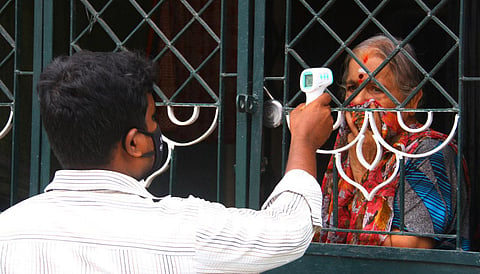

MADURAI: Claiming that the rapid progression of infection and delayed hospitalisation are contributing to the alarming rise in Coronavirus deaths in the district, doctors at Government Rajaji Hospital (GRH) called for an early diagnosis of hypoxia through targeted active surveillance of elderly persons.
Of the total 138 Coronavirus deaths in the district (till July 17), a whopping 95 (68.84%) were reported in this month alone (till Thursday). The district reported one COVID-19 death each in the three months between March and May. COVID-19 deaths in the district began to soar in June. In the month alone, the district witnessed 40 deaths (28.99%).
Notably, of the 95 deaths in the last 16 days, 31 COVID-19 patients (32.63%) died within two days of hospitalisation. While 25 of them had comorbidities, 6 did not have any. Of the 31 immediate deaths, 22 died at Government hospitals - 20 at GRH and 9 at private hospitals.
Head of Treatment Protocol Committee at GRH Dr K Senthil said in the initial months when GRH was treating around 70-100 COVID-19 patients, the deaths were less due to lesser viral load. "When the hospital began to witness a surge in COVID-19 patients as high as 600 patients, the summation effect of the viral load could have caused higher number deaths."
Further, in case of rapid progression of COVID-19, it becomes difficult to save such patients, he added and pointed out at instances of patients dying within 24 hours after being admitted. "In most of the cases, while RT-PCR results are awaited or even before swabs are taken for the test, CT examination of the lungs revealed nearly 70 per cent lung lesions that result in quick deaths. So far, chances for recovery of COVID-19 patients with more than 50 per cent lung lesions are slim," Dr. Senthil said.
Presently, about 90 per cent of COVID-19 patients admitted to the hospital on a daily basis are those suffering from hypoxia (deficiency of oxygen in body tissues) that is characterised by the common symptom - dyspnea (breathing difficulty), while the rest 10 per cent are those with comorbidities. Among the hypoxic patients, about 15-20 per cent are critically ill at the time of admission, he added.
Cytokine storm, a severe immune reaction as part of which excessive cytokines (small proteins) are released into the blood, also plays a role in COVID-19 deaths, he said. "As a result, the body attacks its own cells and tissues rather than just fighting off the virus," he said.
A senior physician at GRH, on condition of anonymity, said that so far most COVID-19 patients, admitted with an oxygen saturation level (SpO2) hardly recovered. Barring RT-PCR test, it takes at least six hours to assess the patient's condition through CT scan (of lungs), chest X-ray and blood test. "By the time the results arrive, the patient's condition deteriorates rapidly," said the physician.
"While patients with 30-40% lung lesions could be cured easily, recovery of patients with 70-80% lung lesions becomes difficult," he said. Early detection of hypoxic patients, especially among the vulnerable group is the key to bring down COVID-19 fatalities, the doctor said.
Meanwhile, the district's Special Monitoring Officer B Chandra Mohan maintained that the district's COVID-19 death rate is same as that of the State's. "It is appropriate to arrive at the death rate, deriving it as a percentage from the total number of COVID-19 patients in treatment, rather than merely considering the count," he pointed out.
He further said that the district recorded it's highest death rate of 1.86 per cent on July 7 and the infection rate had dipped from 16% (a fortnight ago) to 8-9%. "On Wednesday alone, 5,133 samples were tested," he added.